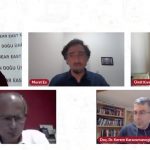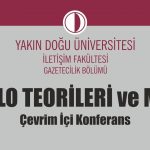
Conspiracy theories, which became widespread in line with the widespread use of Internet technology in mass communication, were discussed at the online conference titled "Conspiracy Theories and Media" organized by the Journalism Department of the Near East University Faculty of Communication.
Documentary filmmaker and writer Ümit Kıvanç, Assoc. Prof. Dr. Kerem Karaosmanoğlu, Dr. Murat Es and Assist. Prof. Dr. Rolien Hoyng from Hong Kong China University, and Kanal Sim Editor-in-Chief Sami Özuslu participated as speakers participated at the online conference moderated by Near East University Communication Faculty Journalism Department Head Assist. Prof. Dr. Ayça Demet Atay.
Alternative reality versus media
Documentary filmmaker and writer Ümit Kıvanç, in his presentation titled "Alternative Reality Against the Media", said that instead of explaining the events by chance, people's motive to search for patterns and social proof behavior played an important role in spreading conspiracy theories. Expressing that the concept of post-truth is the basis for conspiracy theories, Kıvanç stated that efforts to be made against conspiracy theories also face great difficulties.
Stating that conspiracy theories are related to emotional factors rather than reason, Ümit Kıvanç emphasized that the widespread use of conspiracy theories can be prevented by the strong involvement of analytical thinking in the education system. Stating that most of our political behavior is based on the motive of believing, as in conspiracy theories, Ümit Kıvanç said that for this reason, people easily believe even the news that can easily be proven otherwise.
Conspiracy theories are on the agenda due to political relations
Assoc. Prof. Dr. Kerem Karaosmanoğlu evaluated the subject over the marginal mainstream divergence in his speech. Karaosmanoğlu stated that conspiracy theories are on the agenda due to their relevance to politics and that the concepts of hate language and policies, authoritarianism and populism are important factors in conspiracy theories. Karaosmanoğlu said that conspiracy theories and media relations are not independent of this. Karaosmanoğlu also emphasized that conspiracy theories are built against the official thesis and gave examples from publications on the subject in many fields from philosophy to political science.
Dr. Murat Es; “The old world is dying, a new world is struggling to be born. Now is the time for the monsters”
Dr. Murat Es and Assist. Prof. Dr. Rolien Hoyng presented “Media Ecology, Conspiracy Theories and Viral Communication” in their presentation. “We are in a divided media ecology and a post-truth atmosphere,” saying Dr. Murat Es, described the period we live in with the words of Antonio Gramsci: “The old world is dying; a new world is struggling to be born. Now is the time for the monsters.”
Referring to the relationship between conspiracy theories and distrust of the state and institutions, Dr. Es noted that the anti-vaccine campaigns during the COVID 19 process and the resulting insecurity in people's minds against the vaccine constitute an important example of viral communication and gave examples from conspiracy theories around the world.
Sami Özuslu: "The history of Cyprus is very rich in conspiracy theories"
Speaking at the conference, Kanal Sim's Editor-in-Chief, Sami Özuslu, stated that the word conspiracy was found in the word Gombina, which can be explained as being tricked by someone among Turkish Cypriots. Emphasizing that the history of Cyprus, which is one of the oldest problems in the world, is rich in conspiracy theories, Özuslu stated that many conspiracy theories regarding the Cyprus problem such as the imperialism conspiracy, the British conspiracy, ENOSIS, Taksim conspiracy, NATO, and the Russian conspiracy, have come and gone.
Stating that Turkish Cypriots do not favor some of the conspiracy theories commonly believed regarding COVID 19 in the world, Özuslu attributed this to the high education level of the Turkish Cypriot community and the social structure of a secular society.

